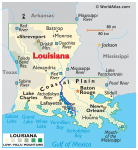SpudNutimus
I make maps and things.
- Pronouns
- he/him
Whether you do this by making the city itself larger, NYC smaller, or both is up to you.

1. My dad is very insulted that you called him a Southerner.I mean frankly if you count it as Southern and not Midwestern, STL is the obvious candidate. Otherwise, one obvious possibility is for the default trade entrepot to not be at present-day New Orleans at all (maybe we butterfly a natural event that makes the instability of the delta more obvious, or there's concerns with the port facilities, or whatever) and the main entrepot/transshipment point is say by Natchez or Ft. Adams?
New Orleans is limited by geography. If the flow of the river was allowed to change and go towards the Atchafalaya River, Lafayette might be a suitable substitute which would be able to grow due to being in higher ground than surrounding areas (somewhat akin to how Memphis and Vicksburg are on bluffs along the Mississippi).
The basin would probably run deeper and wider than OTL due to the extra water running through.
1. My dad is very insulted that you called him a Southerner.
2. Even if he was, the challenge stipulates the Deep South, not just the South.
"Deep South" is Louisiana, Mississippi, Alabama, Georgia, and South Carolina. It generally doesn't include Texas & Florida or the more northerly Southern states. Texas is too easy for this challenge anyway.
Born in South Arkansas here, I'd argue that pretty much all of the state not in the Ouachitas, Ozarks, or Little Rock area is the Deep South, but yeah. You could also make the argument that Memphis could be considered "Deep South" but that's pushing it. I might make a map of what I'd personally consider the Deep South later TBH just for the hell of it.North Florida and East Texas are often included. I would also argue the Arkansas Delta is Deep South.
Born in South Arkansas here, I'd argue that pretty much all of the state not in the Ouachitas, Ozarks, or Little Rock area is the Deep South, but yeah. You could also make the argument that Memphis could be considered "Deep South" but that's pushing it. I might make a map of what I'd personally consider the Deep South later TBH just for the hell of it.
Haha big LafayetteLafayette might be a suitable substitute which would be able to grow due to being in higher ground than surrounding areas (somewhat akin to how Memphis and Vicksburg are on bluffs along the Mississippi).
This is what I would personally consider the Deep South.I might make a map of what I'd personally consider the Deep South later TBH just for the hell of it.
This is what I would personally consider the Deep South.
OK, I'll ask - why the five counties in N Alabama?
